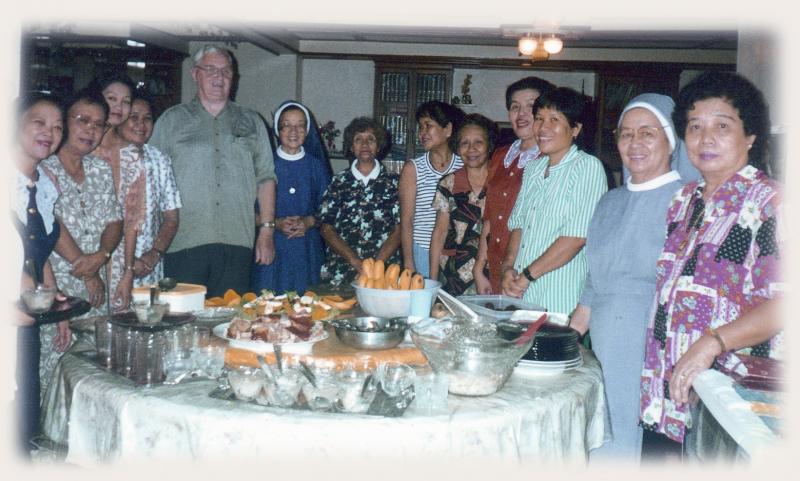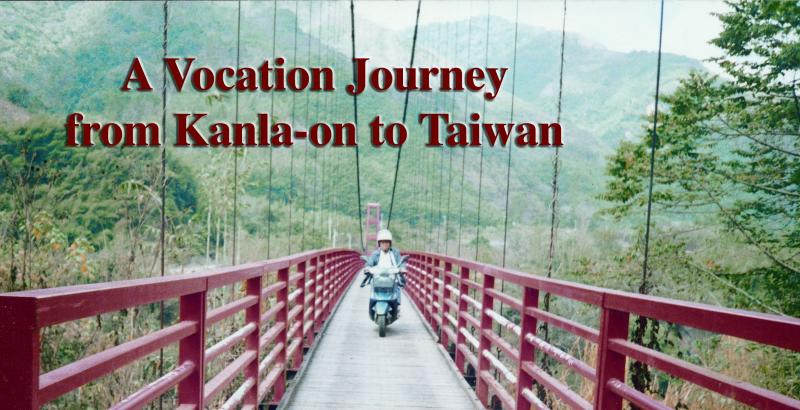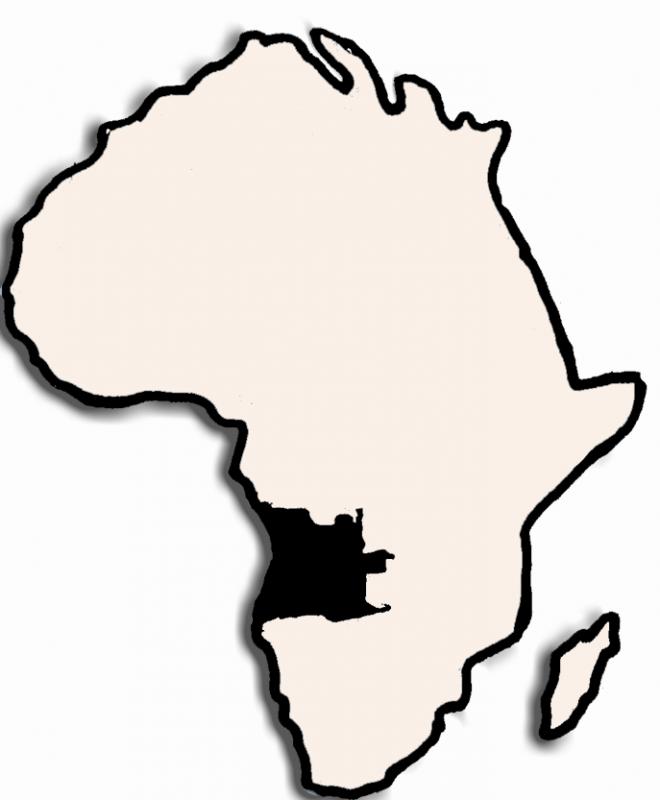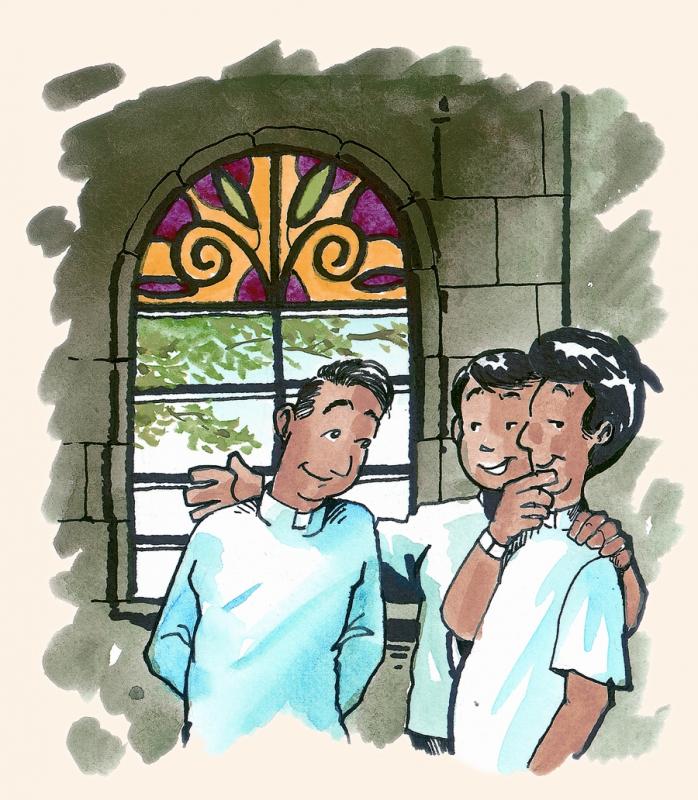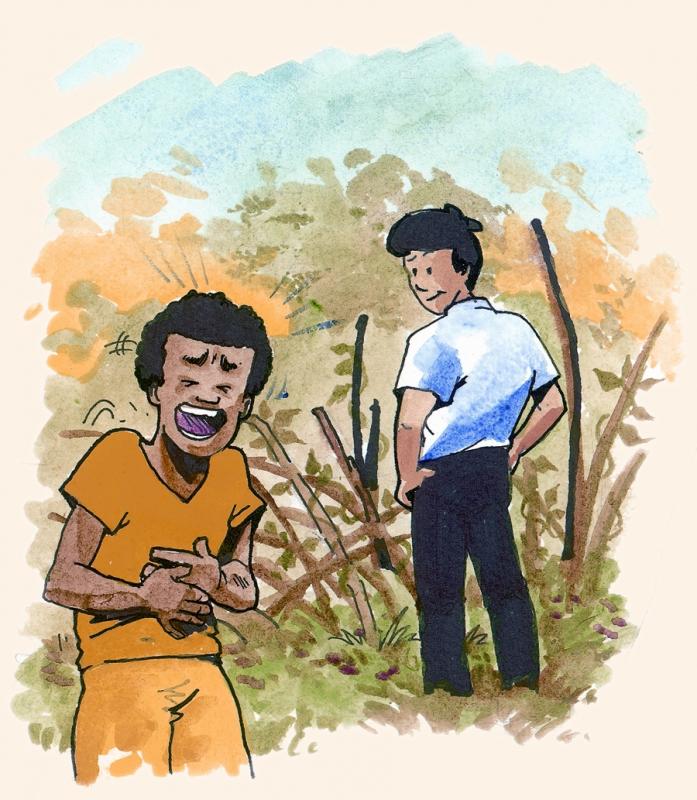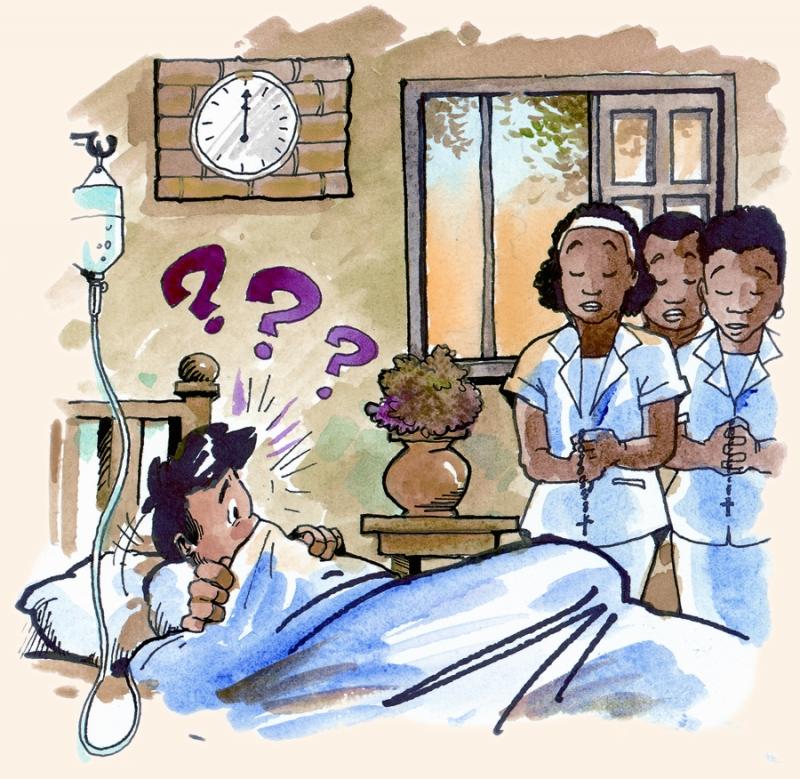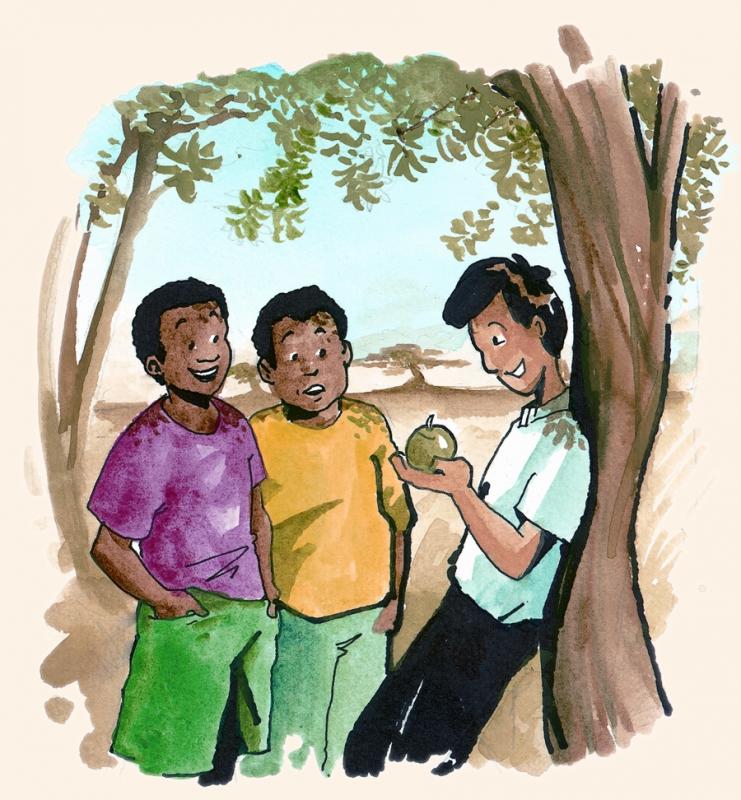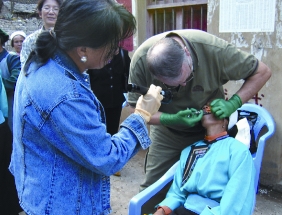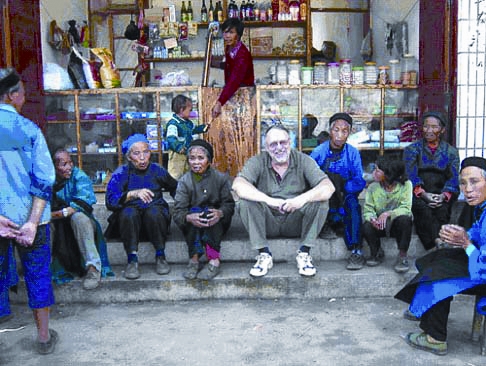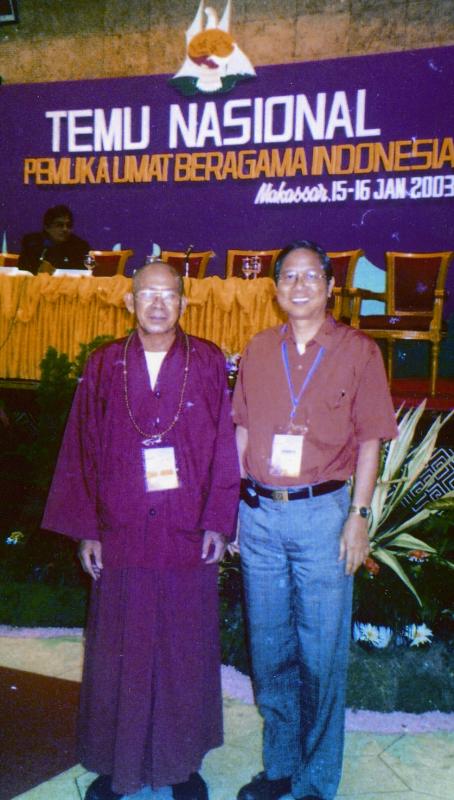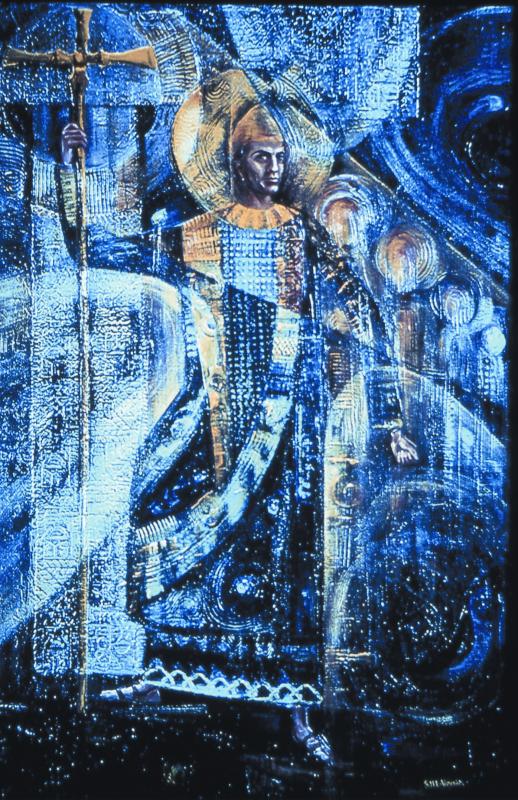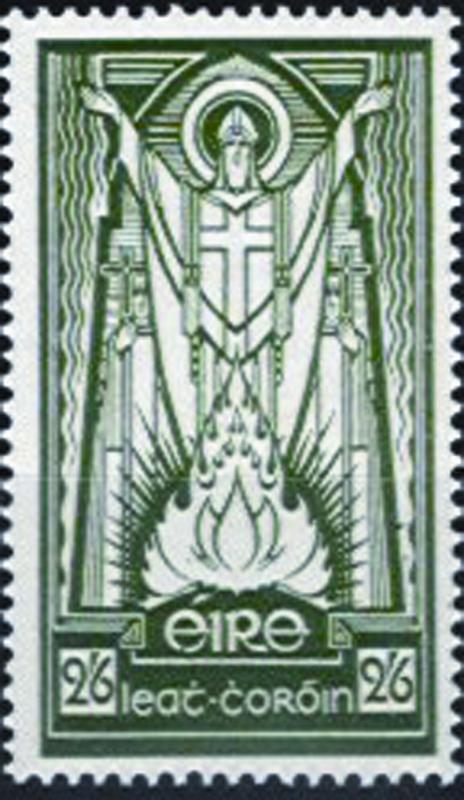March-April 2005
A Tribute To Father Terence Bennett
By Angeles G. Hiñola
Father Terence Bennett, now in charge of the Columban house in Himamaylan, Negros Occidental, retired from parish work in February 2004. His successor, Father Rolly Albert A. Escubido, is a diocesan priest.
The Columbans first came to the Philippines in 1929. By the early1950s they were spread out in Luzon, the Visayas and Mindanao. Their gigantic task was to engage in a massive evangelization program for the Filipino people.
One of the parishes in Negros Occidental that the Columban Fathers took over when they came there in 1950 was my hometown, Kabankalan. At that time, the population of the town was rapidly growing and the old Filipino priest, Padre Juan, could no longer cope with the spiritual needs of the people in the poblacion, in the barrios and in the hinterlands.
Young and inspiring
I first met Fr Terence Bennett in 1954 in my hometown. He was very young, about 27, very good-looking, with a cheerful and smiling face. With his pleasing personality, it was easy for the parishioners to gather in large numbers during his Masses and listen to his homilies, which truly inspired the heart.
One of the many families whose lives he touched was my own. Five of my eight siblings served as acolytes to the Columbans, particularly to Fr Bennett, and one of my sisters joined the Sisters of St Paul de Chartres.
Legion of Mary
One of the assignments of Fr Bennett given by his superior, the late Fr Thomas Cronin, and later by Fr Patrick Hurley, was to supervise the Legion of Mary in the parish, involving teachers and students. The Columbans bought the only high school in town, Kabankalan Academy, now Kabankalan Catholic College, where I taught for five years, which served as the seedbed of the Legion of Mary for the whole parish. Fr Bennett gave us proper instruction about the Legion system, its primary objectives and how we could truly win souls for Jesus through Mary. With his inspiring and challenging allocutios, the spiritual talks given by the spiritual director at each meeting, we legionaries were moved to do our apostolic work with zeal and determination to bring the Word of God to the people to win them from the snares of the devil.
In 1959, I transferred residence to City Heights Subdivision, Bacolod City, and taught in Bacolod City High School. I got married in 1961 and was blessed with four sons and a very religious and devoted husband.
I met Fr Terence Bennett again in 1995 when he was assigned to City Heights as parish priest, taking the place of Columban Father Michael Cullen who retired. He told me of his various assignments in Negros since 1951. He leftNegros in 1960 for six years with Student Catholic Action in Manila followed by seven years in Britain, after which he returned to Negros. He worked as vocation director from 1992 till 1994.
As parish priest
When Fr Bennett came to City Heights in 1995, he was no longer young but retained his good looks and cheerful nature. For nine years, he served as parish priest with true dedication and hard work. He showed this through celebrating the sacrament of reconciliation for two hours every Saturday and teaching us parishioners the value of punctuality. His immediate response to sick calls day or night was truly remarkable, because to him saving the soul of the dying was more important than all the wealth in the world. Another very laudable task was to hear confessions at Bacolod City National High School for teachers and students from Monday to Thursday in preparation for the First Friday Mass. This he did all year round.
But to Fr Bennett, the work of the legionaries was the most fulfilling and truly meaningful to him in his service and love for the poor. He loved the poor and, because of our Legion reports, would inspect their living conditions and provide them with materials for their homes, give medicine to the sick, the elderly, the disabled, and assist in the education of their children. When the parish secretary died of cancer leaving seven young, helpless children and a jobless husband, Father Bennett, with the approval of their father, brought the girls to a home run by Sisters of the Most Holy Trinity in Victorias City and has provided for their food, clothing and education until they are ready to be on their own. He has provided tuition fees for many other poor students in college and in the seminary.
In his final word to us he said, ‘You, my dear legionaries, are the apostles of Christ. Like Sts Peter and John, you should love and respect one another. And as you perform your weekly apostolate, radiate your love to the poor. They need help. They lack faith. They are wanting in knowledge. Be a light to them and lead them out of the darkness of sin so that one day they will be ready to come face to face with our Divine Master.’
To our dear Fr Bennett, we will truly miss you and your spirit-filled allocutios. Rest assured that we legionaries will not fail you in your expectations. We love you.
Farewell.
A Vocation Journey From Kanla-On To Taiwan
By Sr Ma. Adoracion de los Santos DC
My parents were both from Cebu. They evacuated to Negros Oriental during the Japanese occupation, then moved back to Dumanjug, Cebu, in the early 1950s. My birthplace is Alibabay, Kanla-on, Negros Oriental, but I grew up in Dumanjug.
I am the eldest in our family and have three brothers and a sister. Our family’s source of income was farming and fishing, though sometimes my father did carpentry jobs. Thanks to God’s generosity in gifting my father with skills in carpentry, his income from this was a big support to our family, especially for our high school expenses.
My childhood was a combination of happy and sad experiences, all memorable, because I learned many good lessons from them. One happy experience was to see my father rowing our boat ashore loaded with fish. How I loved to watch the expression on his face, one of joy and gratitude to God for having blessed him, as he’d signal to us, while still a few meters from the shore, to get an extra basket because he and his companions had made a good catch that morning.
When typhoon came
One sad experience was when a strong typhoon hit our place. Our crops, corn, coconuts, bananas and vegetables were destroyed by the flood and our hogs and chickens died. When my parents encountered a stressful situation like this, my mother, in particular, was very strict. Sometimes we got a good scolding when we disobeyed her. However, I knew she was a good, kind, caring and loving mother and that she knew what she was doing.
School memories
I have fond memories of classmates, cousins, friends and teachers in the public elementary school I attended. I then enrolled in Little Flower School, owned by the Archdiocese of Cebu, under the direction of Father Francisco Silva, a role model for us. But by the time I graduated, it was under the Society of the Oblates of Notre Dame, the OND Sisters. In high school I started to think about the value and meaning of a religious vocation.
Door to religious vocation
By Divine Providence, after high school, I met the Daughters of Charity. After more than two years of observation that included working in the Provincial House in the Philippines, and then as a lay missionary in Tien Mu, Taipei, Taiwan, in Lourdes Home, a child-caring home for deprived children, I decided to join the community. I had my aspirancy in Tien Mu from November 1976 to March 1977 under the direction of Sr Maria Santos DC. I then went back to the Philippines to start postulancy under Sr Luz Roma DC, a time for getting to know myself and the community better.
Molded by the community
Twenty of us entered the novitiate on 2 February 1978 with Sr Irene Orqueta DC, an outstanding disciplinarian, as our Sister Directress. I learned much from her good example. There were painful moments as my ‘shadows’ surfaced to the gut level of my person. Yet the grace of God generously unfolded my way. With the help of Sr Julma Neo DC I was able to hold on to my commitment to serve God in the poor. Much of her input was centered on the practice of the spirit of the Community - humility, simplicity and charity - repeated in the conferences of St Vincent de Paul. Our classes, personal reflection, group sharing, recreation, regular get-togethers and apostolic experiences helped me to be open to whatever guidelines were given to us in formation. Sister Julma is now a member of the General Council of the Daughters of Charity, representing Asia, living at the motherhouse in Paris, France.
First Assignment
After Juniorate I was sent to Miraculous Medal Mission, Tainan, Taiwan, where the Sisters were very supportive during my initial adjustment. I didn’t stay long, because I had to go to language school where I studied Mandarin for eight months. I found it very difficult at first, the way of writing the strokes and symbols being very complicated and confusing. But as time went on, I got more interested, especially when I started learning how to read and write Chinese characters.
My first vows
After language studies I went to far away Penghu, or Pescadores Islands, where the people we serve, all Buddhists, are simple, very welcoming and friendly to us. I stayed for eight years in this mission and had many beautiful experiences, making my First Vows there, on 2 February 1983, in the presence of Sister Hilda Gleason DC, the first Regional Superior of Taiwan Vice-Province, being the most memorable.
After Penghu, I went back to the Philippines to study social work in Concordia College, Manila. Thank God, I passed the board exam.
Back to Taiwan
I returned to Taiwan in 1992, to an apostolate I loved and enjoyed, serving the elderly in St Francis Home, Ilan Hsien Toucheng. However, after less than two years I was sent to Taipei to once again serve the children in Lourdes Home. This was very difficult and challenging because many of the children have deep-seated behavioral problems. However, it is good to not always feel comfortable but to trust in God’s continuous guidance and assistance.
In 1995 I was sent to work with the Aboriginal Community. St Vincent de Paul Mission is in the south of Taiwan. Our pastoral service is among two of Taiwan’s nine Aboriginal tribes, the Bunun and Rukai tribes. Mieshan village in Taoyuan Country is the farthest of all the six villages we serve and takes two hours to reach by motorcycle. My first trip was the most difficult, because it was raining and there were falling rocks. I spent three hours on that long and winding road.
Surrounded by Catholics
The people in the villages are mostly Christians. It was very interesting working with people who are mostly Catholic, unlike my previous assignments where there were very few Christians. God is so good to me. I am free to share the Good News, teach catechism, prepare adults and children for baptism and First Holy Communion, and so on. The people are cooperative and responsible in parish activities. One of their favorite celebrations is the feast of the Sacred Heart of Jesus when we have a procession, lasting more than an hour, from one village to the village where our parish church is. The parishioners are very enthusiastic and joyful in carrying the large statue of the Sacred Heart.
Missionary Gift
My present apostolate in the mountain gives me new insights in my life as a missionary. I see that the call of service in the mountain is the same call of service in the city, though the setting is different. The enthusiastic response of the Aborigines, the wisdom of the old people, the innocent faith of the children, the hopeful faces of the prisoners and the total trust of the children with disabilities whom I have served in the past 25 years are indeed a ‘Precious Vincentian Missionary Gift.’
Archbishop Romero Of El Salvador 1917-1980
A UN Truth Commission investigating in 1992 the murder of Archbishop Oscar Romero of San Salvador, El Salvador, concluded:
On Monday, 24 March 1980, the Archbishop of San Salvador, Monsignor Oscar Arnulfo Romero y Galdamez, was celebrating Mass in the Chapel of the Hospital de la Divina Providencia when he was killed by a professional assassin who fired a single .22 or .223 caliber bullet from a red, four-door Volkswagen vehicle. The bullet hit its mark, causing the Archbishop's death from severe bleeding.
Archbishop Romero
On 3 September 2004 Judge Oliver W. Wanger of the federal court in Fresno, California, USA, ruled that Alvaro Rafael Saravia, a retired Salvadoran air force captain, was culpable of Archbishop Romero’s death. Saravia, living in the USA for nearly 20 years, went underground about a year before the verdict. He was a member of a death squad of Major Roberto D’Aubuisson and involved in the planning of the assassination. He had ordered his driver to take the gunman in his car to the chapel. The UN Commission’s findings said that D’Aubuisson had given the order for the murder.
Who was Archbishop Romero?
Archbishop Oscar Arnulfo Romero y Galdamez stood up for human rights during the severe repression in El Salvador in the late 1970s. He became the leading voice for victims of the government and for the poor through his Sunday radio homilies, broadcast throughout the country, calling for an end to military repression. Those in power in El Salvador saw the archbishop as a threat to their political agenda.
The day before his assassination, Romero addressed his homily to government soldiers and pleaded, ‘In the name of God, in the name of these suffering people whose cries rise to heaven more loudly each day, I implore you, I beg you, I order you: Stop the repression.’
Romero was nominated for the Nobel Peace Prize in 1979 and is currently being considered by the Vatican for beatification.
Bishop Gregorio Rosa Chávez, auxiliary of El Salvador since 1982, said in an interview:
His last Mass in the hospital chapel was a Mass for the dead. Romero read the Gospel of John where Jesus says, ‘The hour has come that the Son of Man be glorified.’ I ask myself whether he knew in that moment that he was going to be killed. His sermon seems a testament, in which he compares himself with the grain of wheat which opens in the soil to give life. And so some people think that while he was preaching he saw his killer. Reading his last words, he almost seems to be asking the killer, ‘Allow me to die when I go to the altar to offer the bread and wine.’ And in fact he was able to finish his sermon and was killed at the start of the offertory, himself becoming the host of his sacrifice. It is a precious image, and his whole life and death can be seen in the light of it. He lived and died a priest, a pastor in love with Jesus Christ and his flock.
Some Teachings of ARCHBISHOP ROMERO
Our work is priestly work
20 November 1977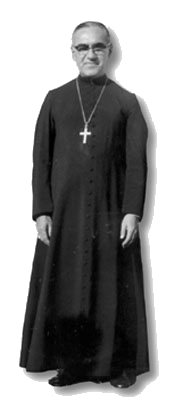
How beautiful will be the day when all the baptized understand that their work, their job,
is a priestly work, that just as I celebrate Mass at this altar, so each carpenter celebrates
Mass at his workbench, and each metalworker, each professional, each doctor with a scalpel,
the market woman at her stand, is performing a priestly office!
How many cab drivers, I know, listen to this message there in their cabs;
you are a priest at the wheel, my friend, if you work with honesty,
consecrating that taxi of yours to God, bearing a message of peace and love
to the passengers who ride in your cab.
Defending God’s Image
December 31, 1977
For the church, the many abuses of human life, liberty, and dignity
are a heartfelt suffering. The church, entrusted with the Earth’s glory,
believes that in each person is the Creator’s image and that everyone who
tramples it offends God.
As holy defender of God’s rights and of his images, the church must cry out.
It takes as spittle in its face, as lashes on its back, as the cross in its passion,
all that human beings suffer, even though they be unbelievers.
They suffer as God’s images.
There is no dichotomy between man and God’s image.
Whoever tortures a human being, whoever abuses a human being,
whoever outrages a human being, abuses God’s image,
and the church takes as its own, that cross, that martyrdom.
A person's measure
March 4 1979
If we are worth anything, it is not because we have more money
or more talent, or more human qualities. Insofar as we are worth anything,
it is because we are grafted on to Christ's life, his cross and resurrection.
That is a person's measure
June 4, 1978
Let's not meditate on a word that is disincarnated from reality. It's very easy to preach a gospel that is the same here in El Salvador as it would be in Guatemala or in Africa.
OOOf course, it's the same gospel, just as it's the same sun that brightens the whole world. But just as sunlight turns into flowers or fruits, according to the needs of the nature that receives it, so God's word has to be incarnated into reality.
And that is what is difficult with the church's preaching. Preaching the gospel without getting involved with reality doesn't bring on any problems, and it's very easy to fulfill a preacher's mission that way. But to cast the gospel's universal light on our own Salvadoran miseries - and also on our Salvadoran joys and successes - that's what is most beautiful about God's word. That way we know Christ is talking to us, to the community of our archdiocese gathered here to meditate on his divine word.
Christ is risen! Alleluia!
By Catherine Doherty
The good news of Christ's resurrection is astounding! It fills the heart with joy! Easter is where God's love triumphs. Christ really died for you and me, and he really rose for you and me, so that we shall rise with him.
When Jesus Christ rose from the dead the whole world changed. History changed; everything changed. In our hearts we hear a radiant love song. All nature sings it, if we have ears to hear.
The more I meet people who deny Christ's resurrection, the more I sense that, strangely, they deny because they believe. For instance, in Harlem the Communists came to me every day, trying to tell me that God does not exist. At the end of three months I said, "Look, day after day you come and drink my coffee and tell me that God does not exist. You must be very worried about God, for if you really believed he didn't exist you wouldn't want to talk about him."
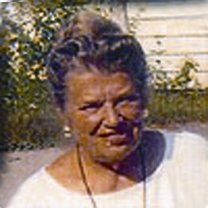
God became human so that he might die and resurrect, for his incarnation and even his passion and death wouldn't amount to anything unless he resurrected. In Russian, the word for Sunday is "Resurrection"—Voskresenia.
When I was a girl growing up in Old Russia, Easter week was really the high point of the year. For instance, during all of Easter week we didn't work. Grocery stores and pharmacies were open for only a few hours, and of course hospital workers, firemen and others in essential services continued as needed, but all other shops were closed.
When you walked down the street, it didn't matter if you were a hundred years old, a pretty girl, an ugly man, a cripple, or had a skin disease. No matter what, people walked up to you, even ones who didn't know you, and said, "Christ is risen; truly he is risen," and you returned the greeting and then the two of you embraced and kissed each other on the cheek three times, in honor of the Holy Trinity. Nobody cared if you were old or young. There was this joy; they just had to kiss each other, on the street and all over the place, and nobody refused to kiss anybody. It was a kiss of great peace and joy.
The whole country literally throbbed with this joy. People walked many miles to be at a certain place, such as a monastery, just to be more joyous, in a sense.
Because we had fasted so rigorously during Lent (the Irish used to call it the "black fast"), during this most festive week everyone feasted on special Easter foods. Even the very poor were either given some or had saved something for that day and week. The paska and koolitch (special Easter bread and a special Easter confection) had lots of sugar in them because we didn't eat sugar during Lent. In these foods, everybody would partake of the "sweetness of Christ," and of the Easter meal.
I sometimes think we completely fail to express the joy of Easter, of Christ's resurrection. But if it isn't in the mores of a country, there is no exuberant celebration of Easter week. I'm not speaking only of multi-religious countries like Canada and America, but even in Catholic ones, there isn't too exceeding a joy—maybe a few fiestas and the like.
We live in the resurrected Lord: hence this joy. Just thinking about God delights me.
When we are recollected in this fantastic, incredible Paschal time that is renewed symbolically and historically each year, it touches us to our very core. We begin to know what love is. If our hearts are open, Christ comes and mysteriously visits each one of us. What can the world give me when I have Christ? I can give something to the world. I can give it God!
This is the glad news that we have to impart to the world: God loved us so much that he became a child, a human being, a man; he walked and talked and lived among us. The earth can witness to this; it still bears his holy footprints. He himself taught us; he suffered and died for us, resurrected and ascended. Alleluia!
The weeks from Easter to Pentecost are weeks of tremendous Christian joy: the joy of knowing that the Lord is risen to everlasting life, and the incredible joy of sharing his resurrection through baptism.
Consider the immense joy of possessing the Eucharist, food from heaven; the joy of living with our minds lifted to the supernatural world; the deep realization that we have divine life and can live supernaturally; and the joy of being witnesses in this world to the risen Christ.
Through these fifty days of Easter time, the Church, bride of Christ that she is, never grows tired of making the world ring with her shouts of joy. Nary a penitential note or sound is heard from her lips; no more fasting or penance for a while! No more tears, for Christ has won his victory. Alleluia! For fifty days we are going to rejoice with the Apostles in the company of the risen Christ.
Christ is risen! In him is my faith, my love; in him I live. Alleluia! Alleluia! Alleluia!
Faces Of The Other
By Father Raymund J Festin SVD
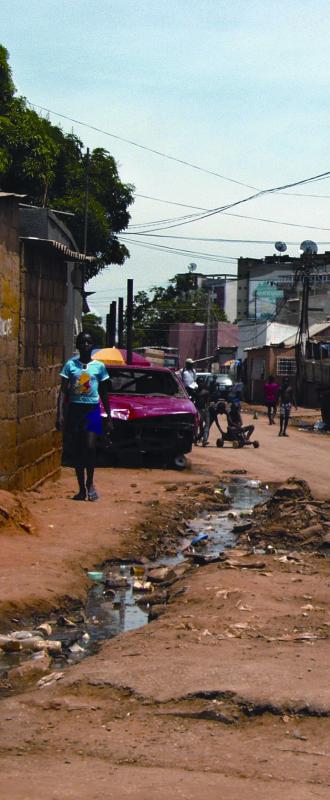
Angola is a hauntingly beautiful country lying along a stretch of Africa’s Atlantic shoreline. It is blessed with the choicest gifts of nature: fertile land, an ocean with a plentiful supply of fish, the air is sweet, tropical fruits abound and diamonds and oil flow like milk and honey. In the remote rural areas, time passes at a serene and soft rhythm, unperturbed by the din of war.
Sadly, Angola, formerly so idyllic, became for more than thirty years the scene of ruin and despair. After a long running struggle with the Portuguese, independence was finally won in 1975. Then, Angola’s liberation forces turned their arms against each other. The fledgling nation was ripped apart by a civil war that wrought untold suffering on her people. The many fertile fields, where the people sowed and gathered their harvest, became battlegrounds of terror and wastelands filled with landmines.
A city of refugees
From 1995 to 1997, I worked in the parish of Christ the King in Luanda, Angola’s capital, on my first mission assignment. At that time, Luanda was groaning under the weight of the teeming thousands who fled the war in the countryside and sought refuge there. It became a city of refugees who settled into shanties or makeshift houses, living in sub-human conditions, as the city’s infrastructure could not cope with the influx.
The streets were chock full of children, mostly orphans, left to fend for themselves. Disabled war veterans also roamed the streets begging for food. Many people were unemployed and eked out a living by peddling wares such as soap, sardines and socks. This climate of gloom often produced a host of other ills: street violence, assaults by armed men and car-jacking.
The reality
My first year in Angola was difficult. It was not only a period of adjustment to a new culture and country, but also an awakening of a new reality in me. During my stay at the Christ the King parish, which is one of the largest in Luanda, my work was mainly pastoral. During my visits to the sick and aged, I came in direct contact with the rasping sounds of the dying, the festering smell of the wounds of the sick and the loneliness etched in the faces of abandoned old folks.
Meeting people living in abject conditions helped me to clarify my attitudes and convictions. At first, I thought my missionary task mainly consisted in self giving, in doing something for the people. They needed me, or so I thought, and I would be there for them. Over the years, I realized that a large part of a missionary work consists in allowing the people to enter my life – letting them give what they have, no matter how humble; needing them; learning from them and allowing them to love in return.
My friends
I formed a bond of friendship with many Angolans. There is the old widow in Luanda, Guilhermina, who shares a damp, dark room across from Christ the King parish with another old woman. She attends Mass everyday and has a profound devotion to the Blessed Mother. During my first year, she became a very good friend and confidant. Her friendship helped me in my missionary life and I cannot thank her enough for the prayers she offered for me and the times she gave me a listening ear. Recently, I received a photo of her holding a statuette of the Blessed Mother, with the message: ‘A remembrance from your friend.’
Angola Map
Shinga of Tomboko is a deaf young man. He is fair game for ‘taunters’. Nobody listens to him because he cannot speak and nobody talks to him because he cannot hear. One day he came to me, smiled and said: ‘Oxhh, ahh, ohh, waaah.’ I smiled and replied, ‘Oxhh, ahh, ohh, waaah.’ He listened to me and I listened to him. From that time forward, we became very good friends. He taught me a different language.
But my best friend is Cristo, a crippled orphan with speech difficulties. We spent a lot of time together. I would take him with me in the car as I traveled around Luanda or visited the ocean. Even though I left Angola in June 2000, he continues to ‘write’ to me, although he can neither read nor write. One of his friends provides words for his thoughts.
I can’t imagine what missionary life would be like without the presence and faces of the other who are always there for me. I see beautiful experiences personified in the colorful faces of real and gentle people. After my leave, I look forward to returning to Angola. When that day comes, Shinga and I will have many things to talk about in a language exclusive to us. And Cristo and I will again sit leisurely in the wind-swept sand as we watch the impatient Atlantic waves rushing against the shore.
Father Festin is on study leave before returning to Angola. You may contact him at: K. Leopold I – Straat, 12/B, 3000 LEUVEN, BELGIUM.
Father Joeker

By Fr Joseph Panabang SVD
SIBERIAN PRIEST
Before Mass at Christ the King Grotto in Quezon City, Fr Joks Galolo SVD introduced me to one of the guest priests who said, as I thought, ‘I am a Siberian missionary.’ I was happy that at last we had a priest from Siberia. Later, he clarified, ‘I’m Fr Eugene Fuccini, a Xaverian missionary, from Northern Italy.’
TOWER OF BABEL
After heavy rain, almost all our climbing beans in the compound fell down. I went outside to check and talked to the plants, ‘That is what you get from going too high. Too proud - you never learned from the Tower of Babel.’ Then I noticed my catechist, standing opposite me, laughing. I believe he thought I was talking to myself.
FALSE ALARM
The Medical Assistant working in our town clinic is a good benefactress of the mission. Once, when I was seriously ill, she and her whole staff came and put me on dextrose. Jokingly, I told them that in case of death they should bury me in Nsawkaw, not in Nsawam where our cemetery is. When I woke up at midnight, I was surprised to see all of them in my room, still praying the Holy Rosary. And to my complete surprise, at about ten o’clock next morning, a very worried Fr Victor Leones SVD arrived from Kintampo. He said the catechist called up and told him I was dying. Ooppps, bad joke!
MANILA APPLE ONLY IN GHANA
Our pioneer Filipino missionary in Ghana, Fr Victor Leones SVD, brought some star apple seeds when he first went there. After ten years, we are now harvesting the fruit. You can now find many star apple trees here, but Ghanaians call them ‘Manila Apples’ – a good-sounding new name. I used to joke the people that the star apple was the apple Adam ate in the Garden of Eden, since it’s so sweet, luscious and pleasing to the eye.
In China With Aitece
By Dr Niels Peter Schmidt
Dr Schmidt, a dentist from Denmark, writes of his work in China with his Filipino wife, Babes C. Aguirre, who taught English in China as a member of the Association for International Teaching, Educational and Curriculum Exchange (AITECE, pronounced ‘EYE-tesh.’)
Recently, my wife, Babes C. Aguirre, and I, returned to Manila after one and a half years in China. Babes taught English as a second language in Guiyang Teachers’ College. She went as a member of AITECE.
Dr Schmidt at work, assisted by his wife, Babes
During Babes’ stay she also organized some voluntary health services for the ethnic minorities in that area, especially the Buyi and the Miao people. She persuaded me to provide dental care during visitsto Guiyang, in cooperation with the local health authorities. As a target we chose some remote villages outside the city of Zhenning and the local hospital inside the city, but here will focus on the Buyi people.
Dr Schmidt relaxing after work with his patients
The Buyi villages we visited are constructed like fortresses surrounded by a ring wall, because of the experience with local warlords and unrest a century ago. The only gate is locked at 9 every night. I was the first dentist ever to visit the villages and people didn’t know what to expect. So many showed up to be cured of blindness, back problems, headaches and so on . . . but we could only pull teeth!
Often the first patient was the barangay chief or political officer, and as he proudly finished his treatment, the line of waiting villagers would grow. Often patients came back, when they realized that the treatment was painless, and would ask for more teeth to be pulled while their mouth was still numb! During my work, the officer would sometimes play L’Internationale, the anthem of international communism and of the former Soviet Union, over the village loudspeakers.
Buyi women are easy to recognize by their dress, blue with a black apron. Most characteristic is the headscarf which covers the balder part of the forehead. The Buyi women pull the hair from the forehead saying that every hair pulled gives more happiness in life.
For me as the dentist, the main problem was to find a seat for the patient high enough so that I didn’t have to kneel during the treatment. Bu the people were so grateful, confident and happy, that it was very rewarding for me. Usually, to show their gratitude, they’d perform a traditional Buyi dance for me and my assistants and offer me sunflower seeds and cigarettes. But I don’t smoke, which was strange to them.
The hospital in the city was very simple: nothing but a spittoon, a slop-pail and a bare mattress on a bed in the ward. No facilities at all for treatment, no medicine. But this is the reality in poor rural areas of China. Western medicine is unaffordable for most hospitals, and traditional Chinese herbal drugs are the only medicine available.
Just outside the hospital was the market, where you find every kind of quackery for pulling teeth, with a complete lack of hygiene. It was funny to see four men cutting the hair of farmers. All looked alike, just like sheep having their annual shearing. Much of the hair lying on the ground had probably been there for months and was ‘alive.’ One good thing was that a haircut cost only P5 - but it showed!
We worked in different villages characterized by the difficulty of access, with no public transportation. It was obvious that villagers seldom visited the larger towns in the region. Life is divided between the village and the paddy fields. Living conditions are very tough and each day brings long hours of hard work with the hoe. China’s one child per family policy is suspended for the minorities as the leaders have realized that the poor need the cheap labor of their children for survival!
Volunteering as we did, opens the eyes to other cultures and widens the understanding of other people. This was not only our reward, but is also the basis for peace among people.
Inter-Religious Dialogue In Indonesia
By Father Ernesto Amigleo CICM
Fr Bert Layson’s article, ‘Peace Process,’ January-February 2004, based on a talk he gave in Bali, Indonesia, in May 2003, evoked a response from Cathleen E. Caga-anan, a student in Manila which, with another article by Father Bert, inspired this article from a Filipino missionary in Indonesia.
Fr Ernie with a Buddhist monk at a National Seminar on Inter-Religious Dialogue
‘When a Muslim saved a Christian’ by Fr Bert Layson OMI and ‘A Student’s Letter to Fr Bert’ by Cathleen E. Caga-anan in the July-August 2004 issue have inspired me to write something about our efforts at the University of Atma Jaya, Makassar, Indonesia, to promote inter–religious dialogue.
After a four-year stint as Director of Novices for our CICM Indonesian candidates, I was appointed to the Catholic University of Atma Jaya in 1999 as chaplain and lecturer.
Quite a distance from the city, the campus of Universitas Atma Jaya is an ideal site for study and concentration. Founded in 1980 by a group of dynamic laypeople, its vision is to give students a proper academic, scientific and technological education imbued with the gospel values of love, justice, truth and respect for human life and dignity. Its mission is to develop academic excellence, professionalism, moral and personal integrity in the whole academic community.
The university has 2,300 students and 200 faculty members and employees. There are four faculties: Economics, Engineering, Law and Agriculture.
Inter–Religious Dialogue
Although the university is Catholic, only 40 percent of its students are Catholics. This represents the present reality in the city of Makassar where Catholics are a minority. The other 60 percent of students, and some lecturers and employees, include Muslims, Hindus, Buddhist and Protestants. Our present rector is a Protestant. Seen from this perspective alone the university is an ideal place to promote and foster the spirit of Inter-Religious Dialogue.
As a missionary where people of many faiths are interacting, often with misunderstanding, conflict and violence, Inter-Religious Dialogue is one of my main concerns. It is what has challenged and motivated me to accept the task of university chaplain. Although I’m Vicar General of the Archdiocese of Makassar since 2003, the Archbishop has allowed me to continue my ministry in the university, for which I am grateful and happy.
In the university we hold a yearly live-in three-day seminar for university students with the theme of Inter-Religious Dialogue. Our aim is for the participants to share their faith and grow in mutual understanding with one another. It is also to help them see God’s love extended to people of different faiths so as to be more aware of the fact that in diversity there is unity and that in God’s eyes we are all brothers and sisters despite our differences. Our differences are gifts from the Lord to be shared and celebrated.
At first, we limited ourselves to our own students. But our positive experience encouraged us to invite students from neighboring universities and colleges. This has proven to be better because as our own students socialize and interact with other students from outside – hence building up relationships with people of other faiths – the other students benefit greatly from the lessons gained throughout the seminar.
The seminar consists of getting to know each other, praying together, sharing of experiences, input from resource persons representing Islam, Buddhism, Hinduism, Protestantism and Catholicism. It is interesting to discover how ignorant many of the participants are about other faiths. The seminar broadens their understanding not only of their own faith but also that of others. The most interesting part of all is a whole day when we visit various temples, churches and mosques. They enjoy most of all seeing the interior of each other’s houses of prayer. In each, someone explains the doctrine of the particular faith and some of its sacred symbols.
It inspires me to see from the participants’ reactions how much the seminar helps them become more open in their attitude towards other faiths. As one said to me, ‘Before the seminar, I used to have many prejudices towards religions not my own; but after, these prejudices are corrected. I believe that fundamentally we are all God’s children and brothers and sisters of one another.’
In the university campus we also hold a prayer for peace in the auditorium. Student representatives from the different faiths are invited to say a prayer according to their religion. Many students, faculty and employees attend. I also invite students of different faiths to take part in the Graduation Mass. Dressed in their different religious garb, they bring gifts for the offering, after which each says a prayer. Then I bless them by laying my hands on their heads. These small attempts, I am glad to say, receive a positive response from the student-body.
Hopes for the Future
My hope is that inter-religious dialogue and harmony may find a real place in the hearts of our students, faculty and employees. Thanks be to God, our university is one of its promoters, although we are conscious of the need to promote it further. This is the challenge of our times, especially in our local context where for the last few years this country has been besieged with ongoing religious conflicts. It is my hope and prayer that our small but significant activities in the university may contribute to the overall promotion of peace, religious understanding and harmony in Indonesia.
You may contact Father Amigleo at frernie2001@yahoo.com or at Jl. Sudirman 48, MAKASSAR, INDONESIA.
Our Hideaway

Our Hideaway is a venue for the youth to express themselves and to share with our readers their mind, their heart and their soul.
A JOY SHARED IS A JOY DOUBLED
By Mark Agustin Barcebal
Near Sta Ana Church in Davao I saw a father holding his daughter’s hand, both happily walking towards the church. Suddenly, the girl stumbled and her father asked, ‘Ba’t ka bumitaw?’ The girl answered, ‘Nahulog kasi ang laruan ko.’ The man picked up his little daughter and they went inside the church.
Treasure in my friends
That scene made me realize the value of friendship. My friends have helped form the story of my life. In a thousand ways, they have turned my limitations into beautiful privileges and have enabled me to walk serenely and happily in the shadow cast by my deprivation. My friends are an oasis to me, encouraging me to go on. They are essential to my well-being. They are ‘my father, my mother, my brother, my sister,’ sometimes more than that.
What I have to give back
Mother Teresa once said, ‘The true and sure way to friendship is through humility, being open to each other, accepting each other just as we are, knowing each other.’ Friendship is a relationship built on trust, which improves happiness and abates misery by doubling our joy and dividing our grief. Kindness, loyalty, trust, listening to, affirming, caring for each other are the simplest terms for showing genuine friendship, leading to more enjoyable relationships. These are built through consistency and commitment backed up by sacrifice demonstrating a desire to meet the need of the other and not merely one’s own. It is my joy in life to find at every turning of the road the strong arms of a comrade to help me onward with my load. And since I have no wealth to give, love, trust and loyalty alone are what I can offer and my prayer is, ‘While I live, may God make me worthy of my friends.
My Divine Friend
The most I can do for my friends is simply to be their friend. If they know that I’m happy in loving them, they will want no other reward. Is not friendship divine in this? Above all else, my heart is full of praise for the Friend of friends, who loves me and gave Himself to save me, who gives me unconditional love, Jesus Christ. To Him be the Glory both now and forever. Amen.
Mark, from Banga, South Cotabato, is studying at Holy Cross of Davao College. You may email him at: affwen_826@yahoo.com
Saint Patrick (385-461): The Impact Of One Life
By Hallie Riedel
St Patrick is the patron saint of Ireland and of Nigeria. His Feast Day is 17 March, Ireland’s National Holiday.We thank The Word of Life, www.wau.org , for this article. Hallie Riedel is a Contributing Writer for that magazine, published in the USA but also available in a Philippine edition. She is married and has three children.
What can an indolent, self-absorbed teenager have to do with God's plan for evangelizing a nation? Sixteen-years-old and from a well-to-do family, this kid has never applied himself to his studies, let alone taken his Christian faith seriously. And yet, through one of those dramatic reversals of fortune that God sometimes allows, the sluggish youth meets the Lord and goes on to become Ireland's great evangelizer, Saint Patrick.
Patrick himself tells the story in his moving Confession. Unlike the many legends that sprang up after his death, this authentic account of his conversion and development is a window into the life of a real person. In it, Patrick speaks honestly of his regrets, struggles, and successes, and always in a tone of heartfelt thanks that ‘the Lord had mercy on me thousands and thousands of times.’ In this fifth-century bishop, we touch the faith of someone who threw himself completely on God's love - someone who inspires our own faith that, if we accept it, divine love can transform and equip us for God's service, too.
Learning to Listen

There is much that Patrick never thought to include in his Confession - so much that one biographer compared the saint's story to a jigsaw puzzle with all the important pieces missing! We do know that Patrick was born in Roman Britain to well-to-do parents who were Christian, but not especially religious. Turbulent upheavals took place during his lifetime (about 385 to 461), most notably the barbarian invasions and the collapse of the Roman Empire in the West.
Young Patrick's privileged lifestyle came to a sudden end around 401, when he was kidnapped by marauding raiders. They took him to Ireland, where he was enslaved for six years. Patrick came to view this apparent tragedy as the best thing that ever happened to him. Left alone to shepherd flocks, without shelter and without comfort, he turned to God and learned to pray: ‘I would pray all the time, right through the day. More and more, the love of God and fear of him grew strong within me, and as my faith grew, so the Spirit became more and more active. . . . In snow, in frost, in rain, I would hardly notice any discomfort.’
As his prayer life deepened, Patrick learned to rely on God and listen for the voice of the Holy Spirit. Through dreams, God assured him that he would return home. He even directed him to the particular ship that would take him there. ‘Not that it was near at hand,’ Patrick wryly remarked. ‘Rather, it was two hundred miles away, in a place I had never seen before and where I knew not a single soul.’ Nevertheless, Patrick obeyed, made good his escape, and found the ship, just as the dream had foretold.
But the testing of Patrick's faith continued, as the captain refused to let him aboard. Patrick's response? ‘I decided to go back to the little hut where I had been staying, and on the way there, I began to pray.’ His confidence in God was rewarded almost immediately: ‘Before I could even get my prayers into focus I heard one of the sailors call after me, “Come, hurry!”’
At the captain's entreaty, Patrick also had occasion to exercise his faith in a more public way. Food ran out after the ship landed in some ‘deserted country,’ perhaps Gaul (modern France), where Germanic hordes had recently sacked and ravaged the land. ‘Turn trustingly to the Lord who is my God,’ was Patrick's advice. ‘Put your faith in him with all your heart, because nothing is impossible to him.’ Suddenly, dinner came walking down the path in the form of a herd of pigs.
The Joy of Obedience
Once back in Britain and reunited with his family, Patrick could easily have fallen back into his old, comfortable patterns. But he had changed for good.
More dreams came. In the first, an Irish messenger handed Patrick one of ‘countless letters’ he was carrying. Reading its opening words – ‘The Voice of the Irish’ - Patrick heard voices crying, ‘We beg you, come back and walk once more among us.’ The plea pierced his heart, inspiring both a love for the people who had been his captors and the conviction that God had work for him in Ireland.
It was not with grim resignation that Patrick decided to return to the land of his enslavement. On the contrary, God's call filled him with joy and astonishment that ‘after so many hardships and great burdens, after my captivity, after so many years spent living among this people that [God] should grant me so great a grace - something which, as a boy, I could never have hoped for or even dreamt possible.’
In 432, after ordination and years of preparation about which little is known, Patrick returned to Ireland. This time he came as a bishop, not a slave.
Through Many Dangers
St Patrick lighting
the Paschal Fire,
symbol of the Risen Christ
Patrick was not the first to carry the gospel to Ireland, but it was through his tireless efforts that Christianity really took hold there. During his thirty-year ministry, he made thousands of converts, established churches, founded monasteries, and developed native clergy. Humbly amazed at this success, he attributed everything to God's grace.
It is impossible to know which of the legends about Patrick are historically accurate. Very likely, his preaching brought him into confrontation with local kings and Druid priests. Sometimes, even Christians opposed him, as some of the British did when Patrick excommunicated Coroticus, a Welsh prince. In his Letter to the Soldiers of Coroticus, Patrick rails against this supposed Christian's enslavement or slaughter of a number of newly baptized Irish Christians, the chrism ‘still gleaming on their foreheads.’ Patrick urged the British bishops to join him in ostracizing Coroticus, so as to stir him to repentance and restitution. How they responded is unknown.
Patrick was acutely aware that he was accomplishing his mission at the risk of his life. Twelve unspecified ‘dangers,’ slavery, and ‘numerous plots’ were only a few of the perils from which God saved him. ‘Daily I expect murder, fraud, or captivity, or whatever it may be; but I fear none of these things because of the promises of heaven. I have cast myself into the hands of God Almighty.’
Only obedience to God's call had brought him back to Ireland, Patrick said. Secure in the knowledge that he was exactly where God wanted him, he could work without fear.
A Culture Transformed
The fruit of Patrick's obedience showed itself not only in the astounding growth of the Irish church itself, but also in its transformation of Irish culture through the influence of the gospel.
The practice of human sacrifice was abandoned. By the sixth century, slavery had become unacceptable. New Christian laws reduced warfare. Monasteries built extensive libraries where Irish scholarship flourished. Within a century after Patrick's death, the Irish devised the Celtic alphabet. They learned Latin, Greek, and some Hebrew. They translated or copied Irish folklore and Christian writings, and also the classics of Greek and Roman literature. Without this, many of these works would have been lost forever.
The gospel sanctified Ireland's existing native culture, rather than bringing about its eradication. In a way that had rarely happened elsewhere, God's word at work elevated the people and their way of life. One example is the Irish love of nature, which was lifted from its pagan, Druid setting to a higher plane. We see this in the prayer which is often called Saint Patrick's Breastplate.. Here, the Christian creed expands and combines with themes such as God's presence in creation, the world as a signpost to God, and nature as good and divinely created:
I arise today
in a mighty strength,
calling upon the Trinity,
believing in the Three Persons
saying they are one
thanking my creator. . .
I arise today
through the strength in the sky
light of sun
moon's reflection
dazzle of fire
speed of lightning
wild wind
deep sea
firm earth
hard rock. . .
God's Ripple Effects
When Patrick returned to Ireland, he had no idea how profoundly his proclamation of the gospel would affect the entire culture. He was simply trying to obey God's voice and be faithful to his calling. But as Pope John Paul II said in a 1979 address at Saint Patrick's College in Maynooth, Ireland, there's no telling what God will do with a person's faithful obedience:
I wish to recall to you one simple but important lesson taken from the life of Saint Patrick, and it is this: In the history of evangelization, the destiny of an entire people - your people - was radically affected for time and eternity because of the fidelity with which Saint Patrick embraced and proclaimed the word of God, and by reason of the fidelity with which Saint Patrick pursued his call to the end.
What I really want you to realize is this: that God counts on you: that he makes his plans, in a way, depending on your free collaboration, on the oblation of your lives, and on the generosity with which you follow the inspiration of the Holy Spirit in the depths of your hearts. The Catholic faith of Ireland today was linked, in God's plan, to the fidelity of Patrick. And tomorrow, yes, tomorrow some part of God's plan will be linked to your fidelity - to the fervor with which you say yes to God's word in your lives.
It's impossible to know the impact God intends each of us to have! Every act of obedience to the Spirit's voice, every moment spent in prayer took Patrick further down the road of God's plan. He couldn't see the end result. Neither can we.
Through Patrick, the complacent teen turned fearless apostle, God transformed a people and culture in a way that has had an impact far beyond Ireland's shores. How he will use our own faithfulness and trust is up to him. Like Patrick, we have only to follow the Lord step by step, with confidence in his love and presence. And with thankfulness, too, that in the divine plan, every decision for good can have a ripple effect that changes the world.
Saint Patrick's Breastplate
Christ be with me
Christ before me
Christ after me
Christ in me
Christ under me
Christ over me
Christ at my right hand
Christ at my left hand
Christ in the wide expanse
Christ in the far distance
Christ in the heights
Christ in the heart of every
person who thinks of me
Christ in the mouth of
everyone who speaks to me
Christ be in every eye that looks upon me
Christ in every ear that hears me.
Strange Encounter
By Sr Grace Dorothy Lim MM
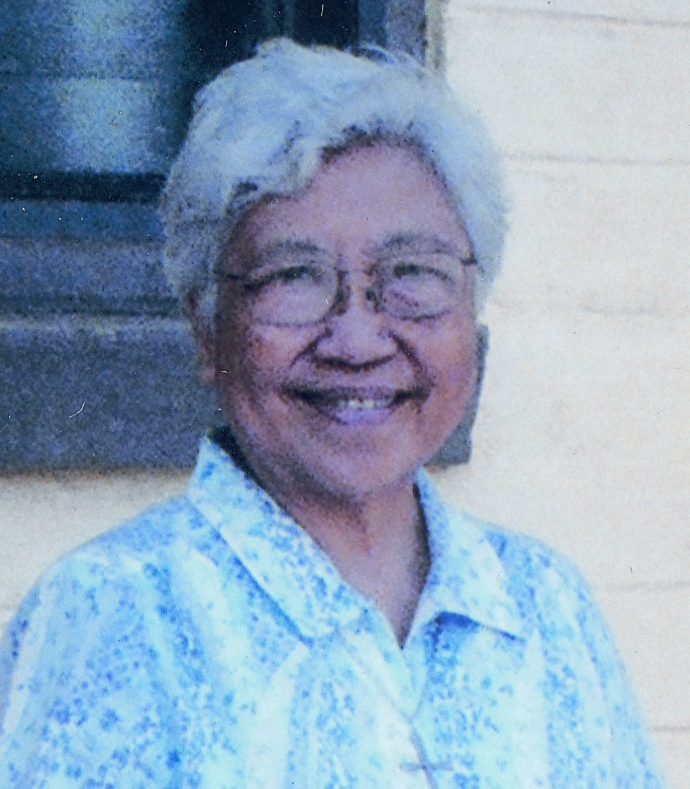
In a while a gentleman, rather elderly, stopped in front of me and asked, ‘Are you a nun?’ ‘Yes,’ I said.
‘Are you a Filipina?’
‘Yes, sir,’ I responded.
He looked at his watch and asked, ‘It’s noon time Have you eaten lunch?’
‘Not yet. I was going home.’
‘No wonder you’re faint. Can I take you to lunch?’
I was grateful for his company. He was kind, well dressed and well-mannered.
I had first gone to Hawaii in 1954. I returned there in 1969 after some study leave. As is the custom, I presented myself to Bishop John J. Scanlan of Honolulu, who had requested the Maryknoll Sisters to send me to his diocese. He was pleased to see me and asked if I spoke Ilocano and whether I was ready to start work among the Filipinos. I was to start from scratch. Having just finished my studies at the East Asian Pastoral Institute (EAPI) and graduating with MA in Religious Education from Ateneo de Manila University, I felt ready and equipped to launch a pastoral program.
But what a downer! Bishop Scanlan welcomed me and was happy that I came, and was grateful to the Maryknoll Sisters for their speedy response to his request. But not only did he not have a program nor any plans for me, he didn’t have any funds for any program I might start. Noticing my surprise, he asked if the Maryknoll Sisters could support me. To be honest, I didn’t quite know how to respond to him, nor did I quite believe what I heard him say.
At my first meeting with Regional Board of the Maryknoll Sisters, I shared my experience with the bishop and asked them whether they had had any discussion prior to his invitation for me to come. They all laughed. I guess they knew their bishop!
I decided to do a survey of Filipino families and started going door-to-door. How did I know which house was a Filipino home? I looked at the yard. If there was an eggplant, a bitter melon vine or akalamonggay tree, I was sure that Filipinos lived there. This survey was going to take a long time, and walking in the heat of day wasn’t going to be easy. And when I got to a Filipino home, I wasn’t always sure to find people there. They might be at work and if there was someone tending the house, he or she was usually elderly.
I decided to go to the Aloha Office Building to visit service agencies that might be able to help me with whatever needs I might encounter on my home visitation. I took the bus downtown. What should have been a ten-minute ride became a 45-minute one. When I got on the bus, I told the driver I was going to Vineyard Street. I didn’t know that King Street was parallel to Vineyard Street. I sat in the bus enjoying my first trip through the town. Before I knew it, the bus pulled over to the terminal and I was the only passenger left on board.
The driver noticed me through the rear mirror and called, ‘Hey, Lady! Where are you going?’
‘When I got on, I told you to drop me off at Vineyard Street,’ said I.
‘Sweet petunia! Don’t you know that Vineyard and King are parallel and they never meet?’
‘I didn’t know that but I know that parallel lines never meet.’
So he laughed and told me to wait till he got some coffee. He took me back to town.
I was able to get a copy of the Service Agencies Directory, free. Others were curious about my future community volunteer work and some groups were already trying to ‘draft’ me to join them.
The gentleman and I continued to talk during lunch and he found out more about me. Was it coincidence? Surely it was God’s providence. My companion turned out to be the uncle my mother wanted me to locate when I got to Hawaii. She had no contact address or telephone number. The lunch turned into a beautiful visit, a reunion of a kind with Uncle Cleto. He had come to Hawaii before I was born and had never returned to the Philippines.
Uncle liked the work I was assigned to in Hawaii. ‘Good! Help the elderly Filipinos who are being ripped off by our own kind,’ he said, before asking, ‘How do you get around?’ ‘I walk or take a bus.’
I’m not sure how surprised he was when I said, ‘The bishop has no money and the Sisters hadn’t budgeted anything for me this fiscal year.’
‘Typical Church: no money! How can you do social work without a car? There are no jeepneys orcaratelas here to take you around.’
He paused and, after a while, said, ‘That won’t do. Your mother would never forgive me if you developed bad calluses on your feet.’
It was getting late. He had to go back to his office and I had to take the bus home. We promised to see each other again.
Next day Uncle Cleto phoned and told me to go to the Island Care Dealer near the airport and to bring my driver’s license. Another Sister drove me over. What a surprise when we got there! The dealer met us, looked at me and said, ‘Sister Grace?’ I nodded.
‘This way, please. Take your pick. And he pointed at the rows of large cars.
I gasped and said, ‘No!’
The streets of Kalihi were very narrow and I wondered if my uncle could really afford a big car. The dealer assured me that I wasn’t to worry about the cost. My uncle was well known to them. But we went home.
I called Uncle Cleto and he was excited to know which car I had chosen. When I told him that they were all too big for the streets of Kalihi and that very likely I’d bump every car I’d meet, he asked, ‘What kind of driver are you?’ We laughed. I told him I needed a small car.
The following day Uncle Cleto phoned again. He had made an arrangement with a US Navy nurse who was being reassigned to the mainland and had to sell her car, a Volkswagen Beetle, just what I wanted.
The bishop and the Maryknoll Sisters had no money. But God, whose generosity we can hardly imagine, sent me not only a VW Beetle but, in a way I couldn’t even dream of, a loving uncle.
You may contact Sr Grace at: St Anthony Convent, 702 Puuhale Road, HONOLULU,
HI 96819, USA.
World Youth Day 2005
Cologne, Germany
August 15-21, 2005
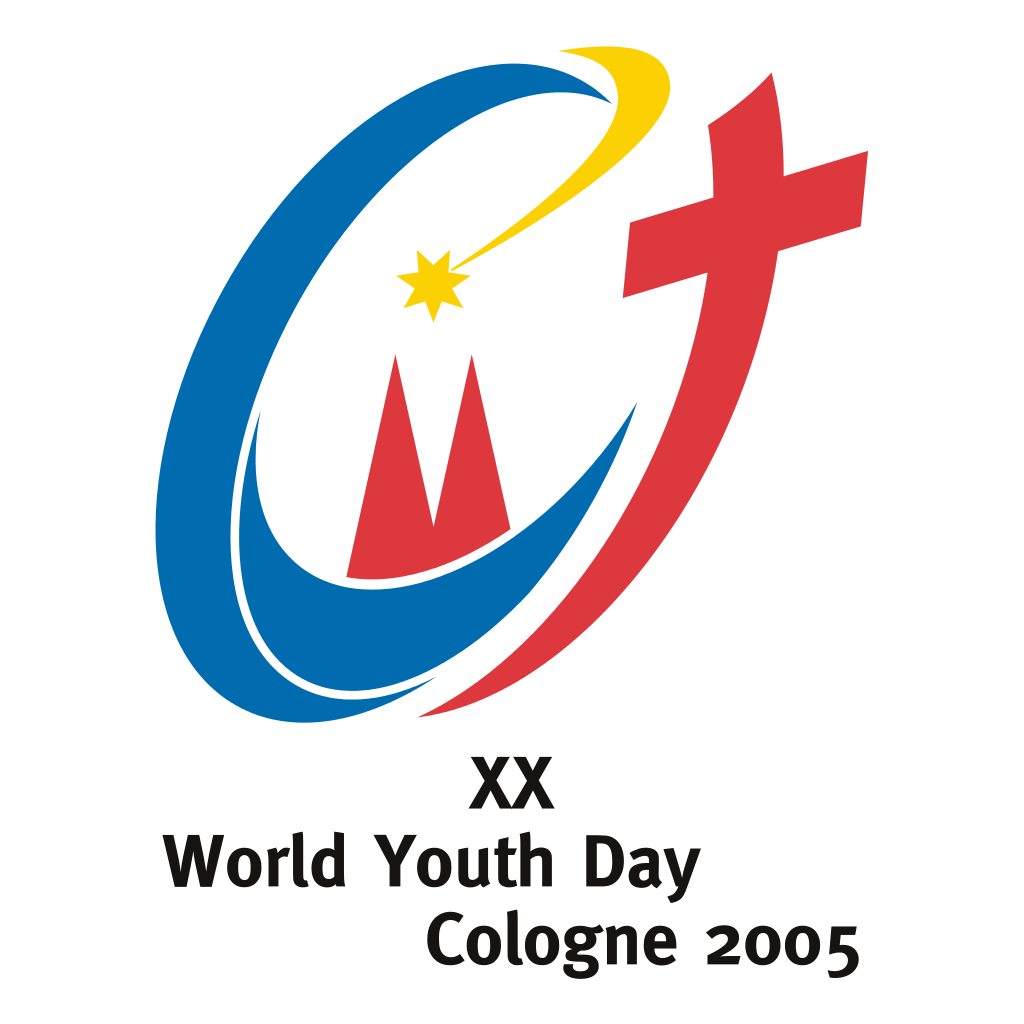
‘We have come to worship him.’ (Mt 2:2)
World Youth Day is an international gathering of young Catholics from all over the world (young people from 177 countries come to WYD). For five days, in one city, you have the chance to meet Catholic young people in a festival of prayer, hope and hopefully fun!
If you want to find out more about your faith or maybe you want to meet with other young people to celebrate your faith, then World Youth Day is for you.
‘The Church has much to say to young people. And they have much to say to the Church. This mutual dialogue mush open-hearted, clear and courageous. It fosters encounter and exchange between the generations and becomes a source of wealth and youth for the Church and society.’
-Pope John Paul II
WORLD YOUTH DAY 2005 PRAYER
Lord Jesus Christ,
Saviour of the World,
You became man
to give us a life in abundance.
You promised to remain with us in Your Church
until the end of time.
Then Your Kingdom will come:
a new heaven and earth
full of love, justice and peace.
This is our hope, our foundation.
Thanks be to You!
Lord, we pray:
Bless the young people around the world.
Reveal Yourself to those who are searching for You.
Awake those who do not believe in You.
Strengthen the faith of those who confess in You.
Let them continuously set out to You,
like the three Wise Men from the East.
Make them architects of a new civilisation of love
and witnesses of hope for the whole world.
Through them be close to those
who suffer from hunger, war and violence.
Inspire by your Holy Spirit those who are contributing
the preparations for World youth Day 2005.
Make them serve your Kingdom
with the power of their faith and their love
and let them welcome their brothers and sisters
from all over the world with open hearts.
Lord, you gave us Mary as our Mother.
Let Her be our advocate for World Youth Day
so that it becomes a celebration of faith.
Bless Your Church with new strength these days,
so that She can become a credible witness for You.
We ask this through You, our Lord and God,
living in the unity with the Father and the Holy Spirit,
reigning forever and ever.
Amen
Your Turn

We sometimes get very reflective responses to articles in Misyon and have already used one as an article. From time to time we’ll publish more. ‘In a year’ has come around for Christine Laungayan, the first to feature in ‘Your Turn,’ and she graduates this March. We wish her and all readers who are graduating God’s special blessings.
Dear Ms Arlene Villahermosa,
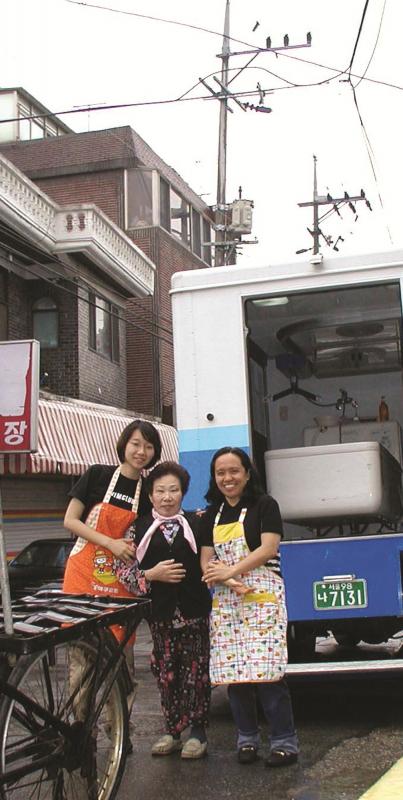 I’m Christine Laungayan, a junior in St. Scholastica’s College, Manila. You’re probably wondering why a 15-year-old kid has sent you an email. Well, here goes. My religion teacher asked us to comment via email on any article of our choice in the March-April Misyon. Truthfully, I never really wanted to do this assignment. However, because it’s a requirement I’m writing.
I’m Christine Laungayan, a junior in St. Scholastica’s College, Manila. You’re probably wondering why a 15-year-old kid has sent you an email. Well, here goes. My religion teacher asked us to comment via email on any article of our choice in the March-April Misyon. Truthfully, I never really wanted to do this assignment. However, because it’s a requirement I’m writing.
I was flipping through the pages of the March-April 2004 issue when I saw your article, Something Beautiful Happened. For some reason, I stopped and read it. No offense, I’m not like those other people who say ‘after reading your article, I felt totally new . . .’ or ‘I felt like God spoke to me’ or ‘it changed my life.’ I’m not going to say those things because I haven’t felt them. However, it got me thinking.
I just like to share my frustrations in life. In a year, I’ll be graduating from high school and will be entering a whole new life. It scares me big-time. I’m still confused about what course I’ll take in college. I’m thinking, what if my decision will be wrong? What if that wrong decision will greatly affect my life? In a negative way? Or, what if I push through with my decision and after ten years or so, I begin to feel that I’m not doing the right thing?
Just like you said in your article, you were happy with your life before you joined the Columban Lay Missionary Program. You went out of your comfort zone for what? I’m really confused. Last week my classmates and I attended a talk about alternative careers or courses. There were three speakers who talked about their journey along the ‘road less traveled,’ their story much like yours. My point here is all of them had ‘lives’ before they took the ‘road less traveled,’ just like you. They had education, great careers, and very comfortable lives which they left, just like that. I mean, how will you know? How will you know that it is time? Is it all worth it? AM I MAKING SENSE?????
This is what happens to confused people. They don’t know if they are making any sense with what they are saying!!!! Maybe I’m writing you this letter because I’m scared. I’m scared that one day, I would have to throw away all of my dreams because God is calling me to do whatever He wants me to do. OR, maybe I’m scared that when my calling comes (if I will be called) I would not be able to answer it because… for whatever reason. I don’t know. All I’m saying is I don’t want to experience the feeling of regret. You know, after all the hard work, the suffering and stuff, I’ll just regret doing it.
I hope you understand what I’m trying to say here. Moreover, I’m hoping that you will say something about what I wrote. I’m really confused. And, a few words wouldn’t hurt… I think. Well, that’s about it. Thanks for reading. May God Bless you. Good luck with whatever you’re doing there.
Truly Yours,
Christine Laungayan
‘Sisters, your god is great!’
By Sister Bernardisa Pacis SSpS
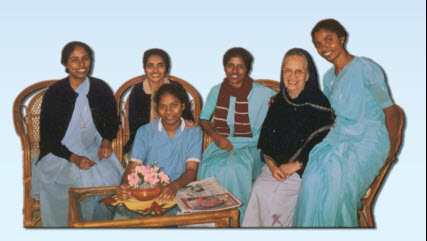
Sister Bernadisa (2nd from right) with fellow SSpS Sister and their helper in their apartment
Sister Bernardisa, from Bacarra, Ilocos Norte, went to India in 1961. Her community of the MissionCongregation of the Servants of the Holy Spirit live in Kolkota (formerly ‘Calcutta’), near the motherhouse of the Missionaries of Charity where the remains of Blessed Teresa of Kolkota are kept.
When I objected to a 200 kilowatt generator shed being built in the corner just below my bedroom window in Nihon Apartments, my complaints fell on deaf ears. For two years we put up with vibrations, air pollution and deafening noise every time the generator was turned on during ‘brown-outs.’ I finally met with the Apartments committee members. The response? ‘No way out. To transfer the generator to another place would prove very expensive.’
One Sunday morning at 9:45 I heard cracking, like stones being thrown on the asbestos roof of the shed of the generator. Then there was a roaring sound, two thick pillars of smoke emitting flames – then a huge fire, only two meters away from where I stood. FIRE! I rushed to my bedroom to gather important files, the money box and a few clothes. I went in back and forth pulling whatever was valuable. My last attempt was met with smoke and the fire outside the windows was raging and soaring. Thank God the windows were closed. I alerted our two young sisters in the next room where they were reviewing for an examination the following day. They stood there, stunned for a while, before finally rushing downstairs. I followed and saw a despairing crowd outside.
It was a blessing that it was a Sunday morning. Our men folk were at home. They took command of the situation, throwing buckets of water and sand on the fire, though it continued to rage. The fire brigade was called but was delayed. Then God ‘crashed’ into our midst in our helplessness. From the clear blue morning sky came rain – a most unexpected phenomenon! All - Hindus and Muslims - shouted: ‘THANK YOU, GOD! SISTERS, YOUR GOD IS GREAT!’ I stood motionless in the eerie silence, overcome by this divine intervention. Indeed, this was a God-experience.
After a while the firefighters arrived and brought the fire under control. Our neighbours brought us back to our flat. The fire didn’t break through our windowpanes but left them cracked all over. Layers of soot had settled in every nook and corner. We then gathered in our small prayer room to thank God for His protection.
As I look back, I realize more and more that this fire was a divine incident. Our mixed Hindu and Muslim community here in Nihon Apartments, although rich in many ways, showed how God-conscious they are. They kept telling us time and again:
· ‘Sisters, your God is great! He truly loves you.’
· ‘To signal that He is in command, He sent rain from a clear blue sky.’
· ‘You pray very often and so God protected you.’
What men could not do, ie, transfer the generator, God did in a few minutes. Soon after, the badly damaged generator was moved from our corner for repair and later to a more accessible, visible place. God is great!
You may contact Sister Berardisa at: HOLY SPIRIT CONVENT, NIHON APARTMENTS, BLOCK A 1- B, 26 B, DR. SURESH SARKAR ROAD, KOLKATA 700014, INDIA
